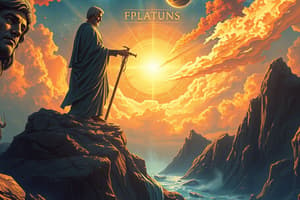Podcast
Questions and Answers
According to Plato, where did the soul dwell before birth?
According to Plato, where did the soul dwell before birth?
The World of Forms
What does the soul sense in the World of Forms?
What does the soul sense in the World of Forms?
The forms in their true state
What happens to the soul when we die, according to Plato's Argument of recollection?
What happens to the soul when we die, according to Plato's Argument of recollection?
It goes back into the World of Forms
How do we recognize good justice, according to Plato's Argument of recollection?
How do we recognize good justice, according to Plato's Argument of recollection?
What is the name of Plato's argument that suggests the soul contains true knowledge?
What is the name of Plato's argument that suggests the soul contains true knowledge?
What is the primary obstacle to gaining true knowledge, according to Plato?
What is the primary obstacle to gaining true knowledge, according to Plato?
What is the role of the philosopher, according to Plato?
What is the role of the philosopher, according to Plato?
What does the charioteer represent in Plato's Chariot Analogy?
What does the charioteer represent in Plato's Chariot Analogy?
What are the three elements of the soul, according to Plato?
What are the three elements of the soul, according to Plato?
What is the function of reason, according to Plato?
What is the function of reason, according to Plato?
What is the lowest element of the soul, according to Plato?
What is the lowest element of the soul, according to Plato?
What happens to the element of desire when the physical body dies, according to Plato?
What happens to the element of desire when the physical body dies, according to Plato?
Flashcards are hidden until you start studying
Study Notes
Plato's Theory of Knowledge
- According to Plato, the soul contains true knowledge, which is gained from the World of Forms before birth.
- In the World of Forms, the soul senses the forms in their true state, enabling recognition of particulars in reality.
The Argument of Recollection
- The soul dwelled in the World of Forms before birth, where it sensed the forms in their true state.
- When born, the soul enters the body, and through recollection, we can recognize the particulars in reality.
- When we die, the soul returns to the World of Forms, repeating the cycle.
Distractions in the World of Appearances
- Plato argues that distractions in the World of Appearances (e.g., bodily pleasures) hinder gaining true knowledge.
The Chariot Analogy
- The charioteer represents the soul, and the two horses represent the mind and body.
- The philosopher must harmonize the pleasures of the mind and body to focus energy on remembering the forms.
The Three Elements of the Soul
- Reason: allows gaining knowledge, distinguishing particulars, and choosing between right and wrong (highest element).
- Spirit: inspires love, courage, and action.
- Desire: meets physical needs, dies with the physical body, and is considered the lowest element.
Studying That Suits You
Use AI to generate personalized quizzes and flashcards to suit your learning preferences.




